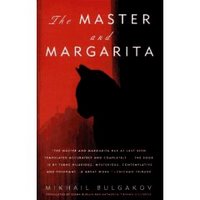The Master and Margarita, Revisited
 Previously I reviewed this novel. As I taught this book again this summer, discussion with students breathed some new thoughts to the meaning.
Previously I reviewed this novel. As I taught this book again this summer, discussion with students breathed some new thoughts to the meaning.The novel itself is nearly impossible to describe. It consists of three separate plots. On the surface is the visit to Moscow, of the Devil in the guise of a professor named Woland, and his henchmen, two grotesque disfigured men, a naked woman and a cat who plays chess among other things. The group proceeds to essentially terrorize the city's intellectual community, mostly by exposing each character's inner hypocracy. The satire of communist society in this section is quite biting, and uproariously funny. Embedded in this story is a "novel within a novel" ...the story of Pontius Pilate and his encounter with the itinerant spiritual man, Yeshua. Finally, there is the story of the separated lovers, the Master and Margarita, who interweave between the other two stories. They live in the present day Moscow, but the Master ostensibly wrote the manuscript which told the story of Pontius Pilate.
This rich and complicated stew of a book works on so many different levels. At it's most obvious, it is a scathing attack on communism and the cultural elite's complicity with the evils of the system. It is also rather pitiless in it's exposure of the greed, corruption and mendacity of human nature. But Bulgakov is not a conventional moralist. The Devil as Woland is an evil figure--sometimes a terrifying figure, and yet he ends up as the instrument of the redemption of both the Master and Margarita. There is a deep spiritual viewpoint at work here. Early in the novel, Yeshua tells Pilate that, "all men are good", to Pilate's incredulity. In the context of the novel, Yeshua seems hopelessly naive, but by the end of the novel, you wonder if this may actually not be the author's central point. Even the devil is capable of some good here.
2 Comments:
Okay...you've convinced me. I'm adding this one to my Amazon list.
Yet another book to read....
Make sure you get the Vintage edition.
Post a Comment
<< Home